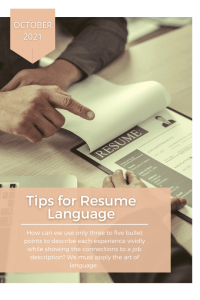By Communication Consultant Xinyi Cui (Accounting and BIS, ’22)
 As we all know, a professional resume is formatted with brief, bullet point statements. Applicants have to show their most relevant and valuable experiences on one single page. How can we use only three to five bullet points to describe each experience vividly while showing the connections to a job description? We must apply the art of language.
As we all know, a professional resume is formatted with brief, bullet point statements. Applicants have to show their most relevant and valuable experiences on one single page. How can we use only three to five bullet points to describe each experience vividly while showing the connections to a job description? We must apply the art of language.
Each bullet point starts with an action verb, which needs to be very powerful and professional. For example, “communicated” is better than “talked,” since “communicated” is more inclusive and emphasized by many positions. Also, try to avoid using the same verb repetitively – some words like “introduced” and “consulted” can replace “communicated” depending on your experiences. More importantly, pick the keywords that can show your skills such as “designed” “analyzed” and “planned.” For more resources, you can go to Lehigh career center or conduct general Google research.
When describing your past or current experiences, it is important to stick to the content of the job requirements. For example, when I look for a job as an auditor, some experiences related to analyzing, problem-solving and consulting skills are very valuable. In that case, I can use the experience of a marketing research intern to hit all three factors. The research experience usually starts with a problem, such as whether or not to change the package of a product. To conduct effective marketing research, the intern assists in designing a research criteria and therefore it shows my logical process of problem solving. This job also requires me to face the client from start to finish, from understanding the client’s needs to presenting the analysis results with a slide deck. In general, I matched these three bullet points from this experience with a professional and organized tone.
Instead of purely describing what we have done, many people may choose to include the purpose or reflection into the bullet points. In that case, it is recommended to quote or reference the companies’ values into your resume. For example, most technology companies label innovation as an important value, so there should be a high frequency of words such as “innovated,” “created,” “changed,” “developed” and so forth, depending on the words used by the company you apply for.
In most cases, using industry jargon is not recommended unless you are certain that everyone understands the meaning so that jargon shows your professionalism. A good example would be ROI and ROA; all accounting and finance people know these terms very well and business professionals in other fields know them, too. More importantly, these acronyms save you a lot of space! However, be alert if you apply for engineering-related positions – these terms won’t make much sense to that audience. Instead, they can cause confusion, so pay attention to specialized terms and use them wisely.
If you are interested to learn more or have any concerns regarding related topics, please do not hesitate to email us or schedule an appointment with us via Zoom.
Get information and resources about our center at The Philip Rauch Center for Business Communication.
This article is adapted from the following source:
Doyle, A. (2021, July 6). Comprehensive List of the Best Power Words to Include in a Resume. Retrieved September 27, 2021, from The Top Power Words and Buzzwords to Use in Your Resume (thebalancecareers.com)
